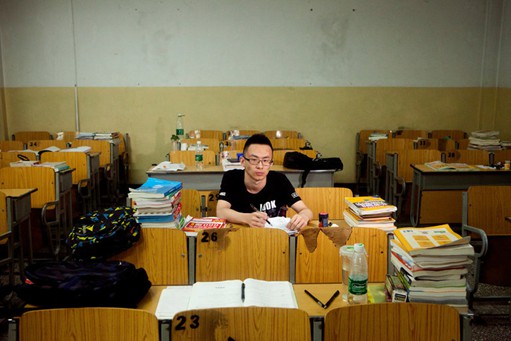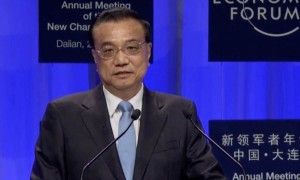导读:人们经常把中国的教育揶揄为应试教育,认为中国学生不具备独立思考的能力,但是新的研究表明直到大学之前,中国培养的学生具备世界上最强大的若干项批判性思维技能。

Chinese primary and secondary schools are often derided as grueling, test-driven institutions that churn out students who can recite basic facts but have little capacity for deep reasoning.
人们常嘲笑中国的中小学是魔鬼训练式的应试教育机构,大批量生产那些只会死记硬背基本事实却不擅长深度推理的学生。
A new study, though, suggests that China is producing students with some of the strongest critical thinking skills in the world.
然而,一项新的研究显示,中国培养的学生具备世界上最强大的若干项批判性思维技能。
But the new study, by researchers at Stanford University, also found that Chinese students lose their advantage in critical thinking in college. That is a sign of trouble inside China’s rapidly expanding university system, which the government is betting on to promote growth as the economy weakens.
但这项由斯坦福大学研究人员所做的新研究同时发现,中国学生在大学阶段失去了批判性思维方面的优势。这表明中国迅速扩张的高校系统内部存在问题。随着经济增速放缓,政府对高等教育寄予厚望,希望以此促进经济增长。
The study, to be published next year, found that Chinese freshmen in computer science and engineering programs began college with critical thinking skills about two to three years ahead of their peers in the United States and Russia. Those skills included the ability to identify assumptions, test hypotheses and draw relationships between variables.
预计于明年发表的这项研究发现,计算机科学和工程学专业的中国大一新生入学时,批判性思维技能领先他们在美国和俄罗斯的同龄人两到三年。这些技能包括识别假定、验证假设和找到变量之间关系的能力。
Yet Chinese students showed virtually no improvement in critical thinking after two years of college, even as their American and Russian counterparts made significant strides, according to the study.
然而,研究表明,读了两年大学之后,中国学生在批判性思维方面几乎没有表现出任何长进,而与此同时,和他们同年级的美国和俄罗斯学生却进步飞快。
The Chinese government has built hundreds of universities in recent years to meet soaring demand for higher education, which many families consider a pathway into the growing middle class. Enrollment last year reached 26.2 million students, up from 3.4 million in 1998, with much of the increase in three-year polytechnic programs.
为满足人们对高等教育迅速增长的需求,中国政府近年来建立了数百所高校。许多家庭将高校视为通往日益壮大的中产阶级的阶梯。去年的高校招生人数由1998年的340万增加到2620万,新增的学生中许多来自三年制的专科高校。
But many universities, mired in bureaucracy and lax academic standards, have struggled. Students say the energetic and demanding teaching they are accustomed to in primary and secondary schools all but disappears when they reach college.
但是,很多高校陷在官僚体制和松散学术标准的泥潭中苦苦挣扎。学生们说,他们在中小学已经习惯了的那种充满活力并且要求严格的教学方式在他们进入大学时几乎消失了。
Others blame a lack of motivation among students. Chinese children spend years preparing for the gaokao, the all-powerful national exam that determines admission to universities in China. For many students, a few points on the test can mean the difference between a good and a bad university, and a life of wealth or poverty.
还有些人将问题归咎于学生们动力的缺失。中国的孩子们为了备战高考寒窗苦读数年。在中国,高考是决定大学录取的最强大的全国性考试。对很多学生来说,这次考试中的几分之差意味着好大学和坏大学的差别,意味着富足和贫穷人生的差别。
When students reach college, the pressure vanishes.
但学生们一旦进入大学,这种压力就消失了。
The Stanford researchers suspect the poor quality of teaching at many Chinese universities is one of the most important factors in the results. Chinese universities tend to reward professors for achievements in research, not their teaching abilities. In addition, almost all students graduate within four years, according to official statistics, reducing the incentive to work hard.
斯坦福大学的研究人员推测,许多中国高校的教学质量低下是导致这种结果的最重要原因之一。中国高校往往会因为研究成果而非教学能力来奖励教授。此外,根据官方的统计数据,几乎所有学生都能在四年之内毕业,这降低了他们努力学习的动力。







